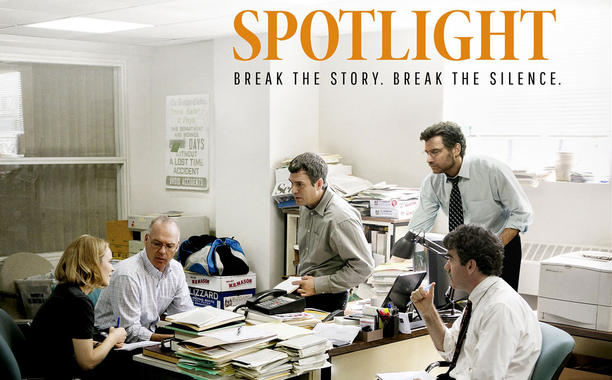Since writing my post about new stories that shun the traditional virtue narrative, I’ve had the chance to watch Spotlight and think it’s another excellent example of this new kind of storytelling.
The film focuses on the team of investigative journalists that exposed and documented the sex abuse scandal within the Boston Catholic Archdiocese. Like The Big Short, the film turns what might be considered less than exciting material (clip-hunting, interview-hounding, data-cleaning research) into a compelling visual story. Also like The Big Short, Spotlight chooses to highlight the immense obstacle of institutional failure over the traditional story of individual character triumphing over adversity.
On the most recent episode of Origami Elephants, JR and I discussed some noticeable differences in this kind of storytelling. First, the protagonist tends to be a team rather than an individual. In Spotlight, our “hero” is a team of four journalists, plus their managing editor and the recently installed editor-in-chief. Second, the film doesn’t take the shortcut of setting up an individual villain. In fact, Spotlight doggedly directs its investigations toward the institution. When the team reports that they have evidence of a cover up by Cardinal Bernard Law, their editor-in-chief, Marty Baron (played brilliantly by Liev Schreiber), instructs them to continue researching in order to establish a systemwide culpability that cannot be dismissed as “bad apple” individual behavior.
The only place that I think Spotlight falls short of the storytelling in The Big Short is when it is revealed that team leader, Walter “Robby” Robinson, was one of the reporters who silenced the original inquiry into the sex abuse scandal. In The Big Short, the audience struggles with the protagonists as they each deal with the realization of, not only the staggering scale of the financial crisis, but more importantly their personal involvement in it. On the other hand, “the Robinson reveal” is quickly defused; the characters and therefore the audience are not allowed to grapple with the moment in the same way. To be fair, I think the scene in question was used by the writers more with the intention to move Marty Baron’s character forward than to complete a moral arc. However, I think it’s a significant omission. One of the tragedies of institutional brokenness is the way that even heroes are dragged into cooperation and collusion with it.
All in all, Spotlight is a fantastic film in a genre that only seems to be gaining momentum. Who knows, maybe we’ll even see a movie willing to take on #OscarsSoWhite.

